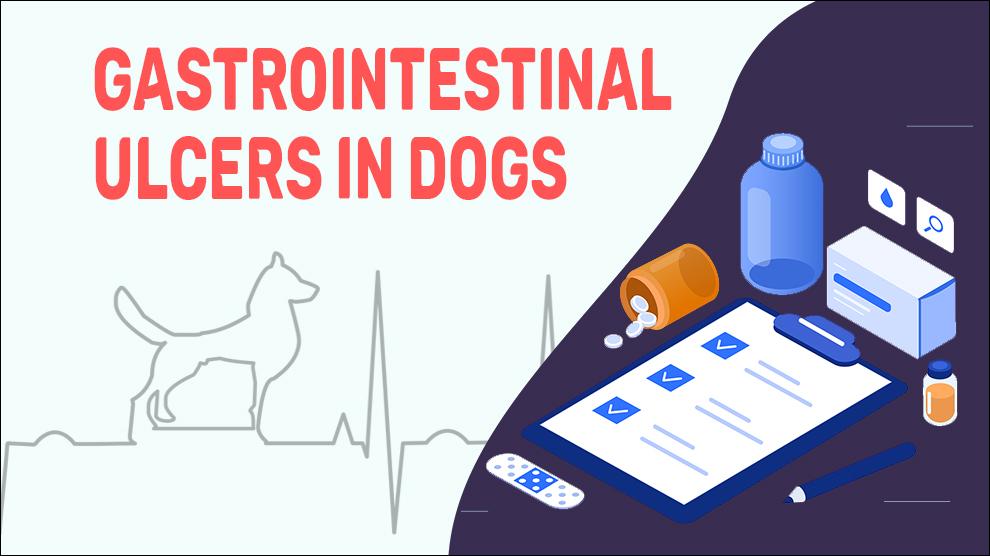Gastrointestinal ulcers often develop because the mucosal lining of the intestinal lumen or stomach is exposed as they are responsible for nutrient absorption and comes in direct contact with the luminal contents. There are various factors that may alter these protective mechanisms.
The gastric mucosal barrier is a multifaceted defense mechanism made up of epithelial, submucosal, and mucus elements. This protects the normal mucosa from the hostile lumenal environment of the gastric contents and hampers diffusion of acid from the lumen and back-diffusion of hydrogen ions into the mucosa.
Simply, the defense mechanism of the GI mucosal barrier balances the potential disruptive properties of the luminal contents. Any deficiency or faults in the normal GI mucosal barrier and failure to regenerate itself leads to a continuous cycle of further mucosal damage. Damage to this barrier allows digestive acids, bile acids, proteolytic enzymes, and hydrochloric acid to interrupt lipid membranes, disintegrate the epithelial cells, and induce apoptosis and inflammation.
The symptoms of GI ulcers are understated and may often overlap or be misdiagnosed with other conditions.
GI ulcers are not age-specific and it is found in both young and old dogs. However, a higher percentage is typically found in athletic breeds and sled dogs.
Symptoms Of Gastrointestinal Ulcers
- “Bowing” posture often (Abdominal pain)
- Anxiety or irritability
- Chronic vomiting with or without bleeding(signs of “coffee grounds")
- Excessive drooling
- Black or tarry stools(melena) /Diarrhea
- Dehydration
- Lack of appetite
- Lethargic behavior (Weakness)
- Pale gums
- Rapid heart rate (tachycardia)
- Weight loss
Treatment Options For Gastrointestinal Ulcers
The Treatment depends upon the underlying cause and extent/severity of the problem.
Medications for medical conditions should be provided only as required.
Most intestinal ulcers can be healed successfully using acid-blocking and gastro-protectant medications.
Histamine-2 receptor antagonists: famotidine, cimetidine, ranitidine, etc.
Proton pump inhibitors: omeprazole or pantoprazole.
Prostaglandin E1 analog: These medications may be considered if NSAIDs are required long term. Misoprostol (Cytotec, Arthrotec) can decrease the harmful gastric effects of NSAIDs.
Supplements: Quercetin Chalcone, L-glutamine, and probiotics to achieve optimal gut health.
Check with your vet for the minimal effective medication level. If vets suggest for medications be discontinued, they should be done immediately.
Home Remedies For Gastrointestinal Ulcers
When your dog is in a vulnerable group due to a situation or condition, providing required medications and feeding an antiulcer diet with supplements can be helpful in preventing ulcers from forming.
Herbs
Aloe vera:1 ml per kilogram body weight
Deglycyrrhizinated Licorice: 100 to 300 mg/daily depending on the size of the dog
EchinacAea: 1.0 g/10 kg body weight
Slippery elm: 100 milligrams per 10 pounds
Alfalfa: Small, medium dogs - 1 teaspoon daily; large dogs - 2 teaspoons daily
Prevention Of Gastrointestinal Ulcers
- Use NSAIDsthat are less likely to cause ulcers.
- Protect your dog from infections, ingestion of toxins, and hyperacidity.
- Use pain relievers regularly for dogs with caution.
- Make sure your pet is free from parasites. Don’t forget to carry out annual fecal (stool checks and keep them on year-round parasite preventatives.
- Snuff out your dog's counter-surfing activities and poke the nose at garbage bags.
- Change your dog's diet to control excess production of stomach acid.
Affected Breeds Of Gastrointestinal Ulcers
There is no breed predisposition.
However, athletic breeds, sled dogs, German Shepherds, and Rottweilers are overrepresented.
Additional Facts For Gastrointestinal Ulcers
1. Causes:
- Addison’s disease
- Adenocarcinoma (tumor in epithelial tissue)
- Allergies/ Adverse drug reaction
- Chronic gastritis
- Gastrinoma (gastrin secretion causing tumor in pancreas or duodenum)
- Exposure to certain drugs, especially long-term medications like NSAIDs or corticosteroids
- Helicobacter (chronic inflammation in the stomach)
- Hepatopathy (venous congestion in liver results from right-side heart failure)
- Hyperacidity of the stomach
- Irritable bowel syndrome
- Ingestion of poison or toxin
- Liver or kidney disease
- Lymphoma
- Mast cell tumors
- Pancreatitis
- Tumors of the pancreas or duodenum
- Viral or bacterial infection
2. Mortality:
In recent times, the mortality rate for gastrointestinal ulcers has decreased radically. Pets with perforated stomach ulcers and peritonitis can result in death if left untreated.
3. Diagnosis:
- Complete blood count
- Serum chemistry profile
- Liver function test
- Gastroscopy
- Ultrasound
4. Prognosis:
There would be some sort of visible improvement in your dog within a few days of treatment; however, healing from ulceration can take up to a few weeks.
The prognosis is excellent for stomach and intestinal ulcers provided that the underlying cause can be treated successfully.
The prognosis may be more guarded if there have been kidney or liver complications or any kind of malignancy.
When To See A Vet
Contact your vet immediately, if you notice any of these signs:
In severe cases of ulcers in dogs:
- Anemia
- Blood in vomiting (hematemesis)
- Disorientation
- Loss of consciousness
- Shock
Food Suggestions For Gastrointestinal Ulcers
- Always stick to low-fat, bland foods.
- Bland diet: boiled chicken, cooked rice, tofu, low-fat cottage cheese, boiled hamburger, canned tuna, etc.
- Provide easily digestible lean cuts of meat. - (boiled and drained of excess fat).
- Semi-moist pet food with boiled chicken or Meat-flavored baby food.
- Low fat, plain yogurt.
- Avoid hard treats, kibble, and biscuits.
- High-fiber foods: whole grain bread, rice, cereal, green beans, peas, Beet Pulp.
Conclusion
When there is an underlying reason for your pet’s GI ulcer, such as a disease, infection, or cancer, then your vet may recommend further diagnosis as that condition must be treated in addition to the intestinal ulcer itself.
Mostly, the gastrointestinal ulcer is treatable and is not fatal to the dog. However, untreated ulcers may lead to other complications like perforations in the stomach wall and anemia. When treated appropriately, intestinal ulcers won't cause danger to the pet’s life in most cases.

















